
Iron: Take with lunch or dinner
Often, you’re best off taking vitamins and supplements with food. Why? Eating gets your digestive juices flowing and helps you break down supplements, says Liz Weinandy, RD, a registered dietitian at The Ohio State University Wexner Medical Center in Columbus. “They are also less likely to make you nauseous when they are taken with food.” For example, she says, “Iron is best on an empty stomach—but it makes many people nauseous, so they don’t take it,” she explains. “It’s better to take it with food than not at all.” Also, caffeine and milk can interfere with iron absorption, so don’t take it in the morning when you’re drinking tea or coffee, or eating cereal.
Are you getting enough iron? Find out if you need to pay attention to your iron intake.

Magnesium: Take before bed
Magnesium confers a long list of benefits, from stronger bones and pain relief to heart health and better sleep. “It’s a good idea to take magnesium before bed since it can make you sleepy,” says Weinandy. Here are 13 benefits of magnesium that could literally change your life.
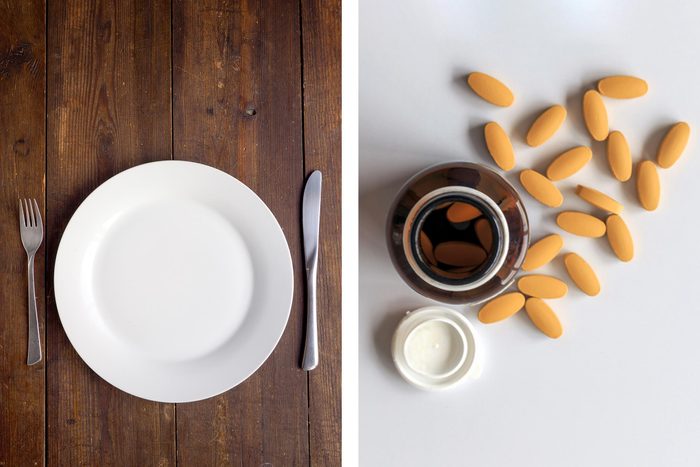
Vitamin C: Take with a meal at the same time every day
Vitamin C is one of nine water-soluble vitamins; because it’s easy to digest, there’s no better or best time to take your C, Weinandy says. That said, Vitamin C is acidic and may cause nausea if consumed on an empty stomach. “Try and take it with food at the same time each day so it becomes a habit,” she says. Check out 6 delicious ways to add more vitamin C in your diet.

B-complex vitamins: Take in the a.m.
This is actually an umbrella term for a bunch of B vitamins: thiamine (vitamin B1), riboflavin (vitamin B2), niacin (vitamin B3), pantothenic acid (vitamin B5), pyridoxine (vitamin B6), biotin, folic acid, and the cobalamin (vitamin B12). “These are best taken in the morning because they can give you energy that you would rather have when the day is first starting.” Learn the 10 surprising ways vitamin B12 can benefit your entire body.
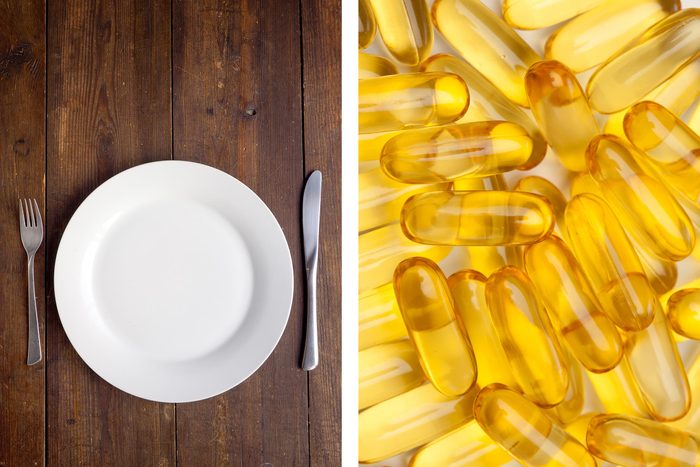
Fish oil: Take right before a meal
Rich in healthy omega-3 fatty acids, fish oil can lower inflammation and help protect against heart disease. (These 7 supplements heart doctors take every day.) The catch? Fish oil can trigger frequent belching, Weinandy says. The best way to avoid this unpleasant side effect is to keep the supplements in the freezer and take them right before a meal, so they go down first. “When frozen, fish oil supplements go down further in your system [before your body can digest them] and they are less likely to cause belching.”
Be sure to never mix your supplements with any of these prescription drugs.

Calcium: Take half in the morning, half at night
If you are taking calcium each day to keep your bones strong, says Weinandy, split the dose in two and take half in the morning and the other half in the evening. “High doses tend to spike calcium levels in the blood and are then excreted by the kidneys. This can cause problems in individuals at risk for kidney stones,” Weinandy warns. Women over 50—and men over 71—need 1,200 mg of calcium daily. Younger men and women need 1000 mg per day. Although you can get calcium from foods, including dairy, supplements can close up any gaps.
Are you deficient? Learn to recognize the 9 signs you’re not getting enough calcium.
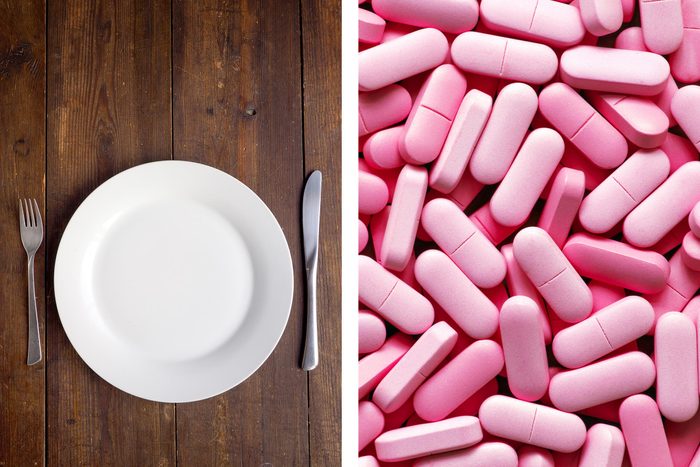
Prenatal vitamins: Take before bed with a small snack
Women who are pregnant need folate (vitamin B9) to help keep their developing baby healthy. Of course it’s best to get yours from folate-rich foods like asparagus, avocados, and Brussels sprouts, and leafy greens such as spinach and lettuce, but your doctor will likely prescribe a supplement. “Many women report feeling nauseated when pregnant, and prenatal vitamins may make this worse,” Weinandy says. To avoid this: “Take them with a small snack before bed, so if they do make you feel nauseous, you can sleep it off.”
Find out which vitamins can boost your sex drive.
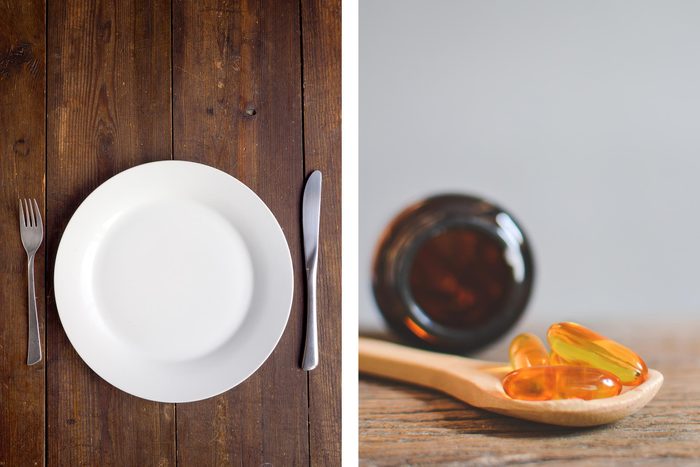
Vitamin D: Take with the same meal every day
People who are low in vitamin D may be at higher risk of brittle bones, some types of cancer, obesity, diabetes, and other chronic conditions. D is known as the sunshine vitamin because your body produces it in response to sunlight. If you live at a higher latitude, you may not get enough sun in winter to produce enough of the vitamin—and it’s hard to get the D you need from fortified foods (such as milk). That can mean you need to supplement. “Vitamin D is a fat-soluble vitamin so you should take it with fat,” Weinandy says. “There is no right or wrong time to take it, as long as you do it with food. Take it at the same time every day so that it becomes a habit,” she says. “The same advice holds for the other fat-soluble vitamins—A, E, and K.” Here’s how to tell if you’re getting enough vitamin D.

CBD: Take in the early morning
Cannabidiol—the oil extracted from some types of marijuana—is all the rage these days. People tout benefits like relief from pain and anxiety; unlike tetrahydrocannabinol (THC), CBD won’t make you high. It comes in many forms—rubs, teas, oils, liquids, powders, and pills. Find out how it can even improve your sex life.
CBD is best taken on an empty stomach so time it around periods of not eating, such as first thing in the morning, suggests Los Angeles sleep expert Michael Breus, Ph.D., and author of several books including The Power of When.
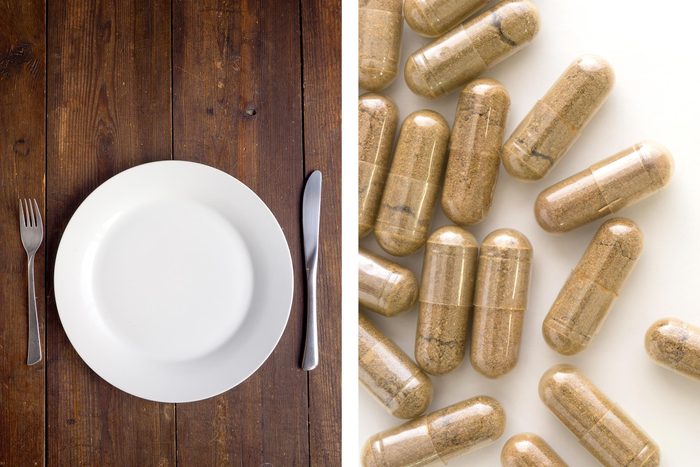
Probiotics: Take with a meal (unless…)
Probiotics are good bacteria that, when present in adequate amounts in the gut, may confer health benefits, says Tsippora Shainhouse, MD. “Some benefits of probiotics are that they may be able to help prevent and even treat some infections and illnesses and promote healthy digestion and perhaps, a healthy immune system,” she explains. There are a dizzying number of types of probiotics available, and the best way to take them will vary, depending on the species. Remember, these are live microorganisms; always follow the instructions on the label for how to store probiotics and when to take them. “Some are best taken with food and some without food,” Weinandy says. “It depends on the probiotic(s) and the way it is encapsulated.” Read on to find out which foods and drinks naturally contain probiotics.

Collagen supplements: Never take in the a.m.
People often take these supplements in hopes of replenishing their collagen—the springy protein that helps skin retain its elasticity, giving it a youthful, dewy look. “Follow the product label since some forms of collagen have reduced effectiveness when taken with certain beverages, such as acidic beverages like orange juice, specifically,” Weinandy says. Next, read up on what collagen really does for your skin and hair.
